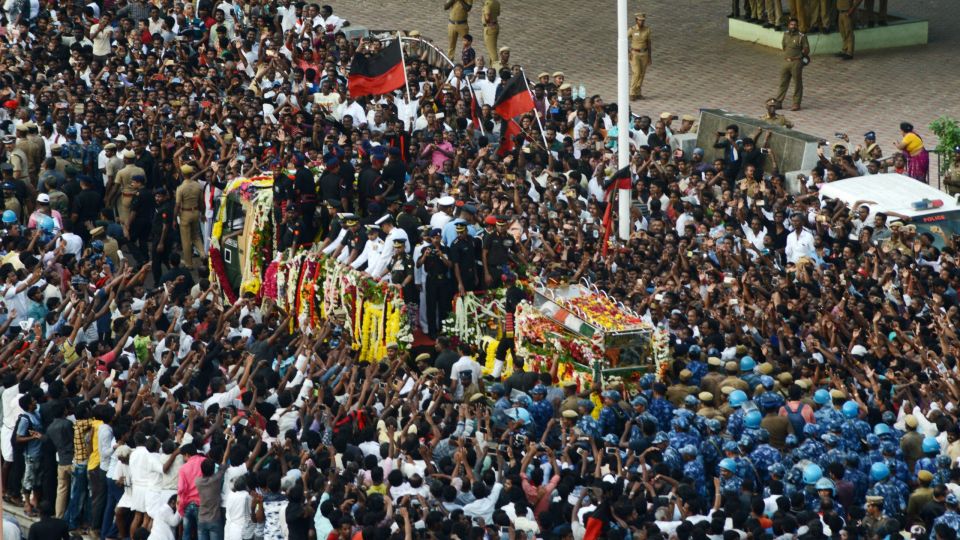August 9, 2018
The popular leader was buried on Wednesday amidst tears and tributes.
Shops were shuttered and streets deserted across Tamil Nadu on Wednesday (Aug 8) as the funeral of Mr Muthuvel Karunanidhi, an iconic politician in the southern Indian state, got underway.
Mr Karunanidhi, the leader of the Dravida Munnetra Kazhagam (DMK) party who never lost his seat in the state assembly for over 60 years, died on Tuesday at the age of 94.
His body lay at Rajaji Hall in the state capital, Chennai, where a huge throng wanting to pay their last respects turned unruly, causing a stampede that eventually left two people dead and 40 others injured.
At one point, the police brandished their batons to keep the ever-swelling crowd of thousands in check after they crashed through barricades. Many mourners shed copious tears with women wailing and men hitting their heads with their fists in anguish at the demise of their beloved “Kalaignar” (“the artist”), a moniker Mr Karunanidhi earned for his linguistic proficiency and artistic ability that saw him pen over 20 screenplays and 100 works of prose and poetry over his lifetime.
In the days leading up to his death in hospital, at least one person committed suicide.
“Karunanidhi was a great leader, an incomparable leader. He was the originator of the Dravidian doctrine which guided the party and state all these years,” Mr K.V. Giri, 72, told The Straits Times at a DMK party office in the city of Coimbatore, which is known as the Manchester of the South.
“Generations of people of this state will remember him with gratitude,” he added.
Among the dignitaries who paid their respects to Mr Karunanidhi – a five-time chief minister – were Indian Prime Minister Narendra Modi and opposition Congress leader Rahul Gandhi. They were joined by a a host of other politicians from across the country, celebrities, business tycoons and ordinary citizens. In New Delhi, the national flag was flown at half-mast at the President’s official residence, Rashtrapati Bhawan, as a mark of respect for the Tamil politician.
Many also chose to stay at home yesterday because of fears of violent demonstrations in a state where the death of popular leaders has often seen stone-pelting and attacks on public property by angry mobs.
Fears were compounded by a court battle between Mr Karunanidhi’s party and the ruling All-India Anna Dravida Munnetra Kazhagam (AIADMK) over the final resting place of the former chief minister .
The DMK had demanded that Mr Karunanidhi be laid to rest at the Anna Memorial, a structure on Chennai’s Marina Beach that was built in memory of former chief minister C. N. Annadurai, who was also Mr Karunanidhi’s mentor. It is also the resting place of two other iconic Tamil Nadu chief ministers – Mr Karunandhi’s long-time rival J. Jayalalithaa, who died in December 2016, as well as M. G. Ramachandran, a one-time friend-turned-foe.
The tradition of Tamil Nadu chief ministers being buried at Marina Beach was started by Annadurai. The DMK wished for the same honour to be granted to their leader, an atheist, to cement his stature and establish a landing point from where the party could seek to buttress its standing in a post-Kalaignar period. In India, the demise of politicians has often resulted in electoral gains for their parties, and with a general election around the corner, analysts are closely watching to see if Mr Karunanidhi’s death helps his DMK party improve upon its poor performance in the last polls, when it won no seats in Parliament. The AIADMK party offered another location for the burial which was close to a memorial for Mahatma Gandhi.
On the streets, many were in favour of Mr Karunanidhi being buried at Marina Beach. Mr N. Robinson, a 28-year-old chartered accountant, told The Straits Times: “He has done a lot of service, good things for underprivileged people. This is very petty. He has probably done more for poor people than most of the politicians.”
Police officer A. Palanisamy was equally vocal. “They are being small-minded, they should have given the land for Karunanidhi.”
The matter was finally decided by the Madras High Court, which passed an order directing the state government to make a plot of land available for Mr Karunanidhi’s body at the Anna Memorial.
Mr Karunanidhi’s son, Mr M.K. Stalin, broke down at Rajaji Hall, where he was standing by the glass casket containing the leader’s body draped with the tricolour national flag, when he received the news that Mr Karunanidhi was being accorded the honour. The crowd erupted in slogans hailing the decision.
At around 4pm, a cavalcade of vehicles departed Rajaji Hall with Mr Karunanidhi’s body ensconced in a gun carriage to make the journey to Anna Memorial. Over a hundred thousand people lined the 2km route, hoping to catch a final glimpse of their beloved leader. Many struggled to touch the truck or walk alongside it.
After a two-hour journey, his body was lowered into the ground with full state honours, including a 21-gun salute, as the crowds wept and mourned. All television news channels in India were focused on the funeral, with many people tuning in from their homes.
Throughout the day the mood was sombre in Chennai and other parts of Tamil Nadu as many reflected on the end of an era.


